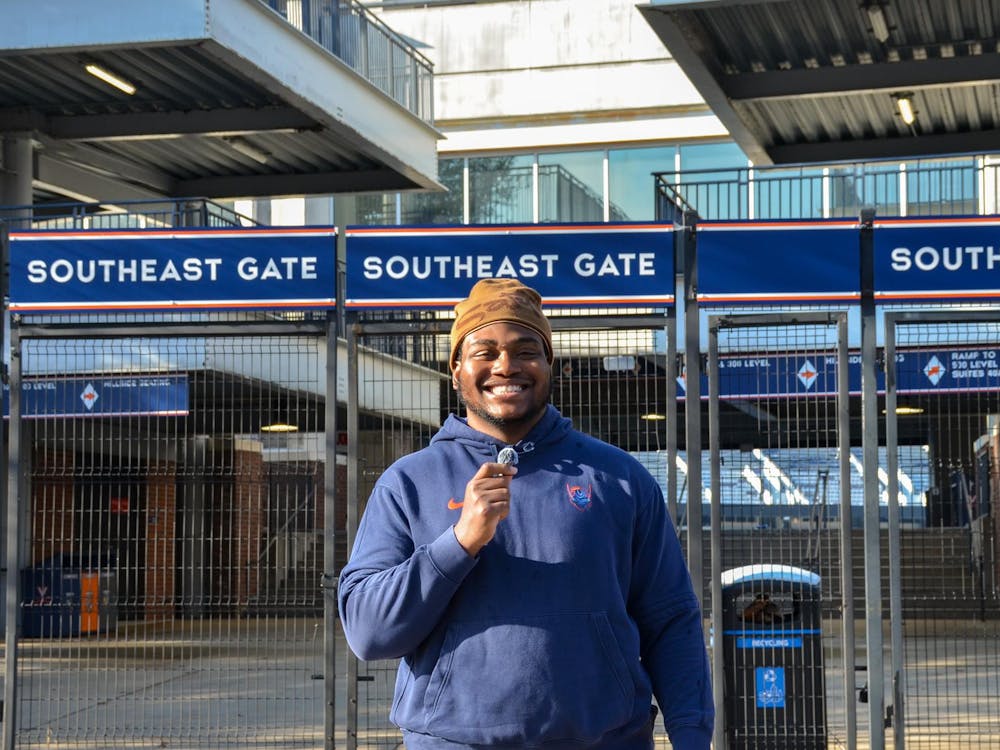I n light of the recent attack on Sigma Alpha Epsilon fra-ternity, the University's Greek students are guarded,perhaps more now than ever before, against outside dangers penetrating the fraternity and sorority environments. By way of response to the troubling event, fraternities are making more of an effort to keep non-University students out of their parties, and some houses even are discussing placing uniformed police officers outside their parties.
However, a specific group of Greek students are calling attention to a different source of danger -- one that's even closer than the nearby citizens of Charlottesville. The finger of the newly founded IFC/ISC Committee Against Sexual Assault appears, in fact, to be pointing straight at the students.
The committee was founded at the beginning of this semester and aims to reduce the risk of sexual assault at fraternity parties. The members wanted to "create a smart, safe venue in which we can discuss these issues," committee co-chair Mike Goldsmith said.
"The idea of the committee originated in discussions with sorority presidents," Goldsmith, a fourth-year College student, said. "They were saying that sexual assault is a major issue at parties, and that often means sexual assault committed by University students. The issue is just not being addressed by members in the Greek community."
The committee's first order of business is to define these ambiguous "issues" and to inform members of fraternities about them.
"It turns out that this is one of the number-one problems that sorority members face," Goldsmith said. "I don't think the majority of the guys realize this."
But the girls certainly do.
"The first few meetings have involved just getting everything out there," Goldsmith said. "What are the problems? What's going on from the female perspective?"
And for University females, a cause for concern does exist.
"I went out a lot when I was a first and second year," fourth-year College student Christy Gillmore said. "And I was always under the impression that I would have to fend for myself if I got into trouble."
The committee is composed of seven men and five women, each a member of a different IFC fraternity or ISC sorority. The policies they create and implement will affect all houses under the Inter-Fraternity and Inter-Sorority Councils, and they've already begun brainstorming.
"I knew last semester that I was going to be on the committee this fall, so I came up with an idea over the summer," Theta Delta Chi fraternity president Jacob Best said.
The concept is simple: a distinctive T-shirt worn by a designated sober officer at a party.
"That way, any guest at the party would know who was in charge," Best said.
Most fraternities already have a rule requiring there to be a sober officer at every one of their open parties, but because few of the guests personally know the officers, it can be difficult to know who to turn to if a problem arises.
"Even if it was as simple as a girl who wants a ride home but doesn't know who to ask, or someone who sees another guest behaving inappropriately, they would know who to talk to," Best said. "Though obviously this wouldn't prevent everything, I think it might head off some problems before they become serious."
The shirts have not yet made an appearance at any fraternity parties, but when they do, students will know it. The logo is a large S³, standing for the alliterative title, "Super Sober Squad."
"We haven't had a party during this academic school year yet, but the hope is to implement the shirt policy at the next one," Best said.
Best said he is doing everything he can to spread the idea to the rest of the Greek community.
"We're trying to get the Office of Fraternity and Sorority Life to buy a bunch of them and distribute them," Best said. "We're advocating them because they're visible, and fraternities can immediately implement them. They also show the University community that fraternity brothers are working to ensure the safety of their guests."
That's "brothers" -- plural. In theory, only one brother will wear the S³ shirt, but he will not act as the sole emergency resource.
"The person wearing the shirt can point a guest in the direction of a younger sober brother who can give guests rides home," Best said. "If nothing else, the person wearing the shirt will know who to talk to. They can locate the president or the social chair and elicit their help."
Best and Goldsmith, both advocates of the shirt, expressed a desire to nip as many potential problems as possible in the bud before guests even enter the party.
"We have a set of strict party patrol guidelines, and that's our first line of defense," Best said. "We always ask the same three questions: 'Do you attend U.Va.? Are you 21? Do you know a member of the house?' And we always insist on seeing their University identification cards, or else they can't come in."
Yet even if everyone in attendance at an open party is a University student, there is no absolute guarantee of safety.
"It can be an uncomfortable issue, but the fact of the matter is that around 80 percent of acts of rape are committed by someone the victim knows," Goldsmith said. "We need to consider the possibility of sexual assault being committed by University students."
Members of the Committee Against Sexual Assault recognize the delicacy of the situation but believe that is not a reason to avoid it.
"We're not trying to target any one person in particular," Goldsmith said. "But there are problems on the inside of the Greek community, and they deserve attention."






